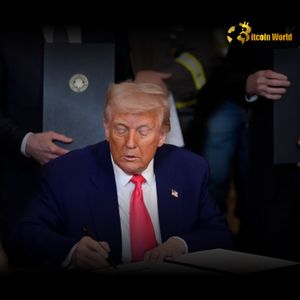US Tariff Authority: Decisive Boost to Government Power After Appeals Court Ruling
6 min read
BitcoinWorld US Tariff Authority: Decisive Boost to Government Power After Appeals Court Ruling Hey there, crypto enthusiasts! While our world often focuses on charts, blockchain updates, and regulatory shifts directly impacting digital assets, it’s crucial to remember that the broader global economic and political landscape plays a significant role. A recent development in the U.S. legal system regarding US Tariff Authority is a prime example of this, potentially having ripple effects that are worth paying attention to. According to information shared by @solidintel_x on X, a federal appeals court has made a significant ruling. This isn’t just about obscure trade laws; it’s about the extent of Government Authority when it comes to imposing costs on international goods. Let’s dive into what happened and why it matters, even if you’re primarily focused on Bitcoin and Ethereum. What the Appeals Court Decision Means for US Tariff Authority The core of this news lies in a federal appeals court ruling that stated the U.S. government indeed possesses the authority to impose tariffs. This might sound straightforward, but it actually overturns a prior decision from the U.S. Court of International Trade. The previous ruling by the Court of International Trade had challenged the executive branch’s power, specifically regarding a reciprocal tariff order issued on April 2nd by the Trump administration. That court had argued that this specific order exceeded presidential powers as defined under the International Emergency Economic Powers Act (IEEPA). The IEEPA is a law granting the President authority to regulate commerce after declaring a national emergency in response to any unusual and extraordinary threat, which has its source in whole or substantial part outside the United United States. However, the federal appeals court has now sided with the government, essentially validating the use of IEEPA in this context to impose tariffs. This Appeals Court Decision strengthens the executive branch’s hand in implementing trade measures, reinforcing the scope of US Tariff Authority under this specific legal framework. Understanding Government Authority and Trade Tariffs To fully grasp the implications, let’s briefly touch upon what Trade Tariffs are and the concept of Government Authority in this area. Trade Tariffs are essentially taxes or duties imposed on imported goods or services. They can be used for various reasons: Protecting Domestic Industries: Making imported goods more expensive can make domestically produced goods more competitive. Generating Revenue: Tariffs collect money for the government. As a Bargaining Tool: Tariffs can be used in negotiations with other countries to achieve trade concessions. Addressing Unfair Practices: Counteracting practices like dumping (selling goods below cost) or subsidies by foreign governments. The power to impose tariffs is a key aspect of a government’s control over its borders and economy. In the U.S., this power is primarily vested in Congress, but certain laws, like IEEPA, delegate specific authorities to the President, particularly during times deemed national emergencies. The legal debate often centers on the interpretation of these delegated powers – how far can the executive branch go without explicit congressional approval for every specific tariff action? The overturned ruling suggested a narrower interpretation of presidential power under IEEPA regarding tariffs, while the appeals court has now endorsed a broader view. This affects the balance of power between the executive and judicial branches concerning trade policy and solidifies a significant area of Government Authority . Potential Economic Impact: Why Crypto Investors Should Care Now, let’s connect the dots to our world. How does a ruling on US Tariff Authority and Trade Tariffs potentially affect the crypto market? The link isn’t direct, but it’s significant through the lens of macroeconomics and global market sentiment. Here’s why the Economic Impact of this ruling matters for crypto investors: Increased Potential for Trade Friction: Validating the executive’s broad tariff power means future administrations could more easily implement tariffs without lengthy legal challenges (at least based on this specific argument). This raises the potential for trade disputes or ‘trade wars’ with other countries. Supply Chain Disruptions: Tariffs can increase costs for businesses that rely on imported goods, potentially leading to higher prices for consumers (inflation) or reduced corporate profits. Supply chain instability can ripple through the global economy. Market Uncertainty: Geopolitical tensions and trade conflicts are major sources of market uncertainty. When traditional markets (stocks, bonds) become volatile due to these factors, it often impacts the crypto market, sometimes acting as a risk-on asset (corralling with stocks) or, for some, a potential hedge against traditional financial instability (though this is debated). Inflationary Pressures: Tariffs are often inflationary as they increase the cost of goods. Central banks might react to inflation, and their monetary policy decisions (like interest rate hikes) have a profound Economic Impact that directly affects crypto valuations. Global Economic Health: The health of the global economy is intertwined with international trade. Policies that impact trade flows can affect economic growth worldwide, influencing investment appetite for riskier assets like cryptocurrencies. While a single ruling doesn’t guarantee immediate, drastic changes, it sets a precedent. It suggests that the executive branch has robust tools at its disposal for trade policy, which could be used in ways that impact global commerce and economic stability. Monitoring these developments is part of being a well-informed investor, even in the crypto space, as the lines between traditional finance, geopolitics, and digital assets continue to blur. Challenges and Uncertainties Following the Ruling Despite the appeals court upholding the government’s position, challenges and uncertainties remain. This ruling specifically addresses the interpretation of IEEPA in the context of reciprocal tariffs, but legal challenges to tariffs can arise on other grounds. Key challenges include: Future Legal Battles: While this specific argument was rejected by the appeals court, businesses and other entities negatively impacted by tariffs may seek alternative legal avenues to challenge them. Political Opposition: Broad use of tariff power can face political opposition domestically and internationally. Retaliation: Other countries may retaliate with their own tariffs, escalating trade tensions. Measuring True Economic Impact: Accurately predicting and measuring the full Economic Impact of tariffs is complex, involving countless variables across different industries and countries. This ruling provides clarity on one legal aspect of Government Authority regarding tariffs but doesn’t eliminate the complexities and potential negative consequences associated with their implementation. Looking Ahead: Actionable Insights for the Crypto Community So, what should you, as a crypto investor, take away from this Appeals Court Decision on US Tariff Authority ? Stay Informed on Macro News: Don’t silo yourself. News about trade policy, inflation, interest rates, and geopolitical events are not separate from the crypto market; they are interconnected. Understand Correlation: Observe how major macro events correlate with crypto price movements. This correlation isn’t always consistent, but understanding potential drivers can help manage risk. Diversification: Consider diversification within your crypto portfolio and potentially across different asset classes based on your risk tolerance and view of the broader economic climate. Focus on Fundamentals (Still Key): While macro factors cause volatility, the long-term success of specific crypto projects still depends on their technology, adoption, and use case. This ruling is a reminder that external forces can significantly influence the environment in which cryptocurrencies operate. Paying attention to shifts in Government Authority and potential Economic Impact stemming from policies like Trade Tariffs is part of navigating the volatile landscape of digital assets. Conclusion: A Boost to Tariff Power with Potential Economic Ripples The federal appeals court’s decision to uphold the U.S. government’s US Tariff Authority marks a significant moment regarding the scope of executive power under IEEPA. By overturning the prior ruling from the Court of International Trade, the appeals court has reinforced the executive branch’s ability to impose Trade Tariffs , providing a Decisive Boost to this area of Government Authority . While this is a legal and trade policy development, its potential Economic Impact is far-reaching, influencing everything from inflation and supply chains to international relations and overall market sentiment. For the crypto community, this serves as a fresh reminder that global economic and political shifts are not isolated events. Understanding these broader trends, even those seemingly distant like an Appeals Court Decision on tariffs, is vital for making informed decisions in the interconnected world of finance and digital assets. To learn more about the latest crypto market trends, explore our article on key developments shaping economic trends and institutional adoption. This post US Tariff Authority: Decisive Boost to Government Power After Appeals Court Ruling first appeared on BitcoinWorld and is written by Editorial Team

Source: Bitcoin World



